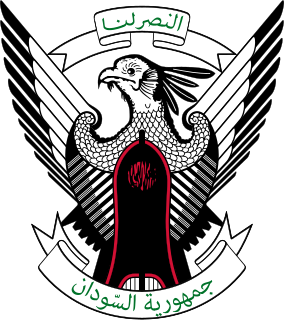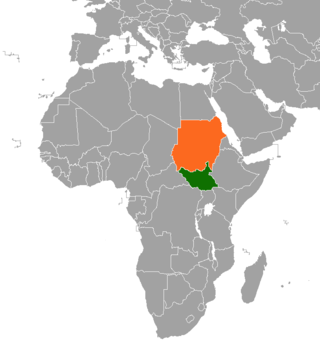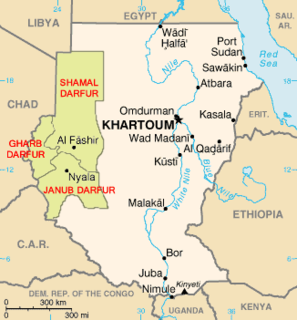
Some human rights organizations have documented a variety of abuses and atrocities carried out by the Sudanese government over the past several years. The 2009 Human Rights Report by the United States Department of State noted serious concerns over human rights violations by the government and militia groups. Capital punishment, including crucifixion, is used for many crimes.

Omar Hassan Ahmad al-Bashir is a Sudanese politician who is currently the seventh president of Sudan and head of the National Congress Party. He came to power in 1989 when, as a brigadier in the Sudanese Army, he led a group of officers in a military coup that ousted the democratically elected government of prime minister Sadiq al-Mahdi after it began negotiations with rebels in the south. Since then, he has been elected three times as President in elections that have been under scrutiny for corruption. In March 2009, al-Bashir became the first sitting president to be indicted by the International Criminal Court (ICC), for allegedly directing a campaign of mass killing, rape, and pillage against civilians in Darfur.

The most recent Chadian Civil War began in December 2005. Since its independence from France in 1960, Chad has been swamped by the civil war between the Arab-Muslims of the north and the Sub-Saharan-Christians of the south. As a result, leadership and presidency in Chad drifted back and forth between the Christian southerners and Muslim northerners. When one side was in power, the other side usually started a revolutionary war to counter it.

The War in Darfur, also nicknamed the Land Cruiser War, is a major armed conflict in the Darfur region of Sudan that began in February 2003 when the Sudan Liberation Movement (SLM) and the Justice and Equality Movement (JEM) rebel groups began fighting the government of Sudan, which they accused of oppressing Darfur's non-Arab population. The government responded to attacks by carrying out a campaign of ethnic cleansing against Darfur's non-Arabs. This resulted in the death of hundreds of thousands of civilians and the indictment of Sudan's president, Omar al-Bashir, for genocide, war crimes, and crimes against humanity by the International Criminal Court.
Ahmed Mohammed Haroun is one of four Sudanese men wanted by the International Criminal Court (ICC) for war crimes and crimes against humanity in Darfur. Despite international pressure on the government of Sudan to surrender him to the ICC, Haroun served as Sudan's Minister of State for Humanitarian Affairs until May 2009 when he was appointed to the governorship of South Kordofan. In September 2007, he was appointed to lead an investigation into human rights violations in Darfur. In July 2013 he resigned as Governor of South Kordofan, and was reappointed by Omar al-Bashir as Governor of North Kordofan.
Musa Hilal is a Sudanese Arab tribal chief and militia leader and adviser to the Sudanese Minister of Internal Affairs. His Um Jalul clan exercised tribal leadership of the Arab Mahamid tribe in Darfur. The Mahamid are part of a larger confederation of camel-herding (Abbala) tribes of the Northern Rizeigat. Hilal is the leader of the Janjaweed militia, which was responsible for a massive military campaign against civilians in Darfur in 2003, as part of a counterinsurgency effort against Darfur rebel groups. On 21 January 2008, the Federal Government of Sudan announced the nomination of Musa Hilal as the chief advisor of the Ministry of Federal Affairs in Sudan. This position allows Mr. Hilal to coordinate with regional leaders surrounding Darfur, as well as with Arab tribal groups, on the relations of the military regime.

The 2007–2008 Ethiopian crackdown in Ogaden was a military campaign by the Ethiopian Army against the Ogaden National Liberation Front (ONLF). The crackdown against the guerrillas began after they killed 74 people in an attack on a Chinese-run oil exploration field in April 2007.
Sudan has a conflict in the Darfur area of western Sudan. The Khartoum government had, in the past, given sanctuary to trans-national Islamic terrorists, but, according to the 9/11 Commission Report, ousted al-Qaeda and cooperated with the US against such groups while simultaneously involving itself in human rights abuses in Darfur. There are also transborder issues between Chad and Darfur, and, to a lesser extent, with the Central African Republic.

In May 2008, the Justice and Equality Movement (JEM), a Darfur ethnic minority rebel group, undertook a raid against the Sudanese government in the cities of Omdurman and Khartoum.

Sudanese nomadic conflicts are non-state conflicts between rival nomadic tribes taking place in the territory of Sudan and, since 2011, South Sudan. Conflict between nomadic tribes in Sudan is common, with fights breaking out over scarce resources, including grazing land, cattle and drinking water. Some of the tribes involved in these clashes have been the Messiria, Maalia, Rizeigat and Bani Hussein Arabic tribes inhabiting Darfur and West Kordofan, and the Dinka, Nuer and Murle African ethnic groups inhabiting South Sudan. Conflicts have been fueled by other major wars taking place in the same regions, in particular the Second Sudanese Civil War, the War in Darfur and the Sudanese conflict in South Kordofan and Blue Nile.

Protests in Sudan, also nicknamed as the Sudanese Intifada, began in January 2011 as part of the Arab Spring regional protest movement. Unlike in other Arab countries, popular uprisings in Sudan had succeeded in toppling the government prior to the Arab Spring in 1964 and 1985. Demonstrations in Sudan however were less common throughout the summer of 2011, during which South Sudan seceded from Sudan, but resumed in force later that year and again in June 2012, shortly after the government passed its much criticized austerity plan.
The outbreak of the Libyan Civil War was followed by accusations of human rights violations by rebel forces opposed to Muammar Gaddafi, Gaddafi's armed forces, and NATO. The alleged violations include rape, extrajudicial killings, ethnic cleansing, misconduct and bombings of civilians.

The Sudanese conflict in South Kordofan and Blue Nile, also referred to by some media as the Third Sudanese Civil War, is an ongoing armed conflict in the Sudanese southern states of South Kordofan and Blue Nile between the Army of Sudan (SAF) and Sudan People's Liberation Movement-North (SPLM-N), a northern affiliate of the Sudan People's Liberation Movement (SPLM) in South Sudan. After some years of relative calm following the 2005 deal which ended the second Sudanese civil war between the Sudanese government and SPLM rebels, fighting broke out again in the lead-up to South Sudan independence on 9 July 2011, starting in South Kordofan on 5 June and spreading to the neighboring Blue Nile state in September. SPLM-N, splitting from newly-independent SPLM, took up arms against the inclusion of the two southern states in Sudan with no popular consultation and against the lack of democratic elections. The conflict is intertwined with the War in Darfur, since in November 2011 SPLM-N established a loose alliance with Darfuri rebels, called Sudan Revolutionary Front (SRF).

Human rights in South Sudan are a contentious issue, owing at least in part to the country's violent history.
Ethnic violence in South Sudan has a long history among South Sudan's varied ethnic groups. South Sudan has 64 tribes with the largest being the Dinkas, who constitute about 35% of the population and predominate in government. The second largest are the Nuers. Conflict is often aggravated among nomadic groups over the issue of cattle and grazing land and is part of the wider Sudanese nomadic conflicts.

Human rights violations during the Syrian civil war have been numerous and serious, with United Nations reports stating that the war has been "characterized by a complete lack of adherence to the norms of international law" by the warring parties who have "caused civilians immeasurable suffering".
Throughout the ongoing Darfur genocide in the Darfur war there has been a systematic campaign of rape, which has been used as a weapon of war, in the ethnic cleansing of black Africans from the region. The majority of rapes have been carried out by the Sudanese government forces and the Janjaweed paramilitary groups. The actions of the Janjaweed have been described as genocidal rape, with not just women, but children also being raped, as well as babies being bludgeoned to death and the sexual mutilation of victims being commonplace.
The 2014 Bentiu massacre occurred on 15 April 2014 in the town of Bentiu, in the north of South Sudan, during the South Sudanese Civil War. The attack has been described by The Economist as the "worst massacre" of the ongoing civil war.

The Darfur genocide refers to the systematic killing of Darfuri men, women, and children which occurred during the ongoing conflict in Western Sudan. It has become known as the first genocide of the 21st century. The genocide-which is being carried out against the Fur, Masalit and Zaghawa tribes-has led the International Criminal Court (ICC) to indict several people for crimes against humanity, rape, forced transfer and torture. According to Eric Reeves, more than one million children have been "killed, raped, wounded, displaced, traumatized, or endured the loss of parents and families".















